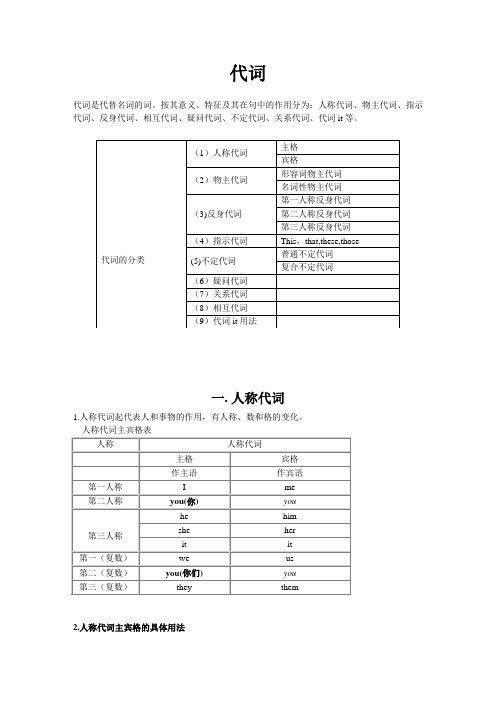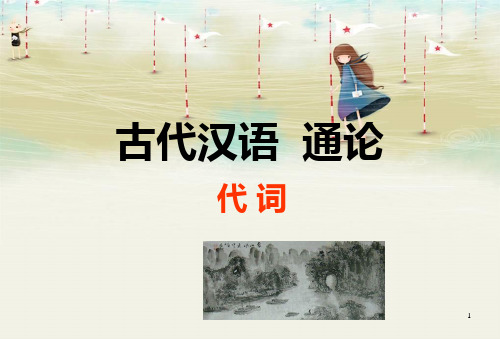代词1
人称代词1

人称代词英语人称代词是指直接指代人或者事物的代词。
在英语和汉语中都有三种人称代词,即:第一人称(我;我们),第二人称(你;你们),第三人称(他、她、它;他们、她们、它们)。
根据人称代词在句中所充当的成分可以分为主格人称代词、宾格人称代词。
另外,人称代词有单复数之分,特别是第二人称单复数写法都是一致的,实际翻译时应当注意。
一、人称代词表格二、第一人称代词1. 第一人称代词主格"I" "we"例句1:I made a big mistake. 我犯了一个大错误。
注释:主格人称代词"I"在句中充当主语。
例句2:We met by chance. 我们偶然相遇。
注释:主格人称代词"we"在句中充当主语。
2. 第一人称代词宾格"me" "us"例句1:Would you please give me a hand? 你能不能帮我一把?注释:宾格人称代词"me"在句中充当动词"give"的宾语。
例句2:Bad habits will prevent us from stepping forward. 坏习惯会阻挡我们前进的步伐。
注释:宾格人称代词"us"在句中充当动词"prevent"的宾语。
第二人称代词1. 第二人称代词主格"you"(你), "you"(你们)例句1:You have a natural gift for math. 你很有数学天赋。
注释:第二人称代词主格"you"在句中充当主语。
例句2:You are all good students. 你们都是好学生。
注释:第二人称代词主格"you"在句中充当主语。
本句话是复数,指代"你们"。
英语中的代词

英语中的代词英语中的代词英语作为一种广泛使用的语言,其中一个重要的语法范畴是代词。
代词在英语中起着重要的作用,它们在句子中代表了已经提到的人、物或事情。
这些代词通常用于简化句子结构,并使文本更加流畅。
在英语中,代词通常用于替代已经提到的事物,以避免重复。
它们可以替代名词、名词短语,甚至整个句子。
通过使用代词,我们可以更有效地传达我们的意思,同时使我们的文本不显得冗长。
英语中的代词有很多种,以下是一些主要的代词类型:1、人称代词:这是用来代替人的代词。
例如,我(I)、你(you)、他(he)、她(she)、它(it)、我们(we)、他们(they)。
2、指示代词:这些代词用于表示特定的对象。
例如,这个(this)、那个(that)、这些(these)、那些(those)。
3、疑问代词:这些代词用于提问中,用于询问人、物或事情。
例如,谁(who)、什么(what)、哪里(where)、何时(when)、怎样(how)。
4、关系代词:这些代词用于引导从句,并表示从句与主句之间的关系。
例如,谁(who)、什么(what)、哪里(where)、何时(when)、怎样(how)。
5、不定代词:这些代词用于表示不确定的或未知的人、物或事情。
例如,一个(a)、一些(some)、任何(any)、每个人(everyone)。
正确地使用代词可以帮助我们创建清晰、易于理解的文本。
也需要注意不要误用或错用代词,以免引起混淆或误解。
总的来说,英语中的代词是一个重要的语言工具,可以帮助我们更好地表达自己的意思。
小学英语语法代词小学英语语法代词:介绍、用法和注意事项在英语学习过程中,代词起着非常重要的作用。
尤其是对于小学生,掌握代词的用法能够更好地理解和运用英语。
本文将为大家介绍小学英语语法中的代词,包括其特点、用法和注意事项,以帮助孩子们更准确地使用英语。
一、代词的种类和特点在小学英语语法中,常见的代词有:人称代词、物主代词、反身代词、指示代词和不定代词等。
代词(1)人称、物主、反身代词

代词代词是代替名词的词。
按其意义、特征及其在句中的作用分为:人称代词、物主代词、指示代词、反身代词、相互代词、疑问代词、不定代词、关系代词、代词it等。
一. 人称代词1.人称代词起代表人和事物的作用,有人称、数和格的变化。
2.人称代词主宾格的具体用法1)人称代词在句中作主语(用主格):She is a teacher(作主语) __________love our country. (我们)It is my book.他很诚实_________________________________.我喜欢他_____________________________.注意:(1)he.she和it的复数形式相同,都是they, 其宾格形式也相同,为them。
(2)主格代词(I,she等)一般不单独使用,也不用于带not 的简短回答中,这种情况下往往用宾格代词。
——Who did it? ——Me/Not me.a.Who washed the clothes? _________(我)/_________________.(不是我)b.who lost the bag ? ___________(她)/_________________.(不是她)c.Who broke the cup? ____________(他们)/_________________.(不是他们)2)在句中充当介词和动词的宾语(用宾格)例如:Xiao Li helped me with my lessons. He had a talk with me this month.We all know _________.(她)Can I call __________________ now? (他们)I will invite ________________ to my birthday party.(他/她)Please look at___________.(它)Can you help me to take care of _____________(他们)3)作表语。
高考英语代词(一)解题方法和技巧及练习题

高考英语代词(一)解题方法和技巧及练习题一、单项选择代词1.-When shall we go to see the movie The Hunger Games together?-Make it ________ day you like; it's all the same to me.A.one B.any C.another D.some【答案】B【解析】试题分析:考查形容词辨析。
本句中的any意为“任意一个”,another另外一个;some一些;one一个;句意:—我们什么时候一起去看《饥饿游戏》这部电影啊?—你喜欢的随便那一天都行,我都没关系的。
根据句意可知使用any day,表示任意一天都可以。
故B正确。
【名师点睛】本题要特别注意any意为“任意一个....”,语气很强烈;another作形容词时,是指在原有的基础上再加一(些),表示“再一(些)”或“另外一个(些)”的意思,在心理上至少有三个.another还可作代词,意思与作形容词时一样.它前面不能加任何冠词,后面也不能加s【举一反三】The medicine is on sale everywhere. You can get it at _______ chemist's.A. otherB. someC. anotherD. any〖答案〗D试题分析:考查代词:A. other其他,B. some一些,C. another另一个,D. any任何一个,句意:这个药到处都在卖,你可以到任何一家药店买到它。
选D。
考点:考查形容词辨析2.If I have ever feared death before, it was ______ compared to how I felt as the roller coaster that moved faster and faster.A.anything B.something C.nothing D.everything【答案】C【解析】考查代词。
初中英语语法讲解第四章代词(一)

初中英语语法讲解第四章代词(Pronouns)代词:是代替名词以及起名词作用的短语、动词不定式、V-ing 形式、从句或句子的词。
一.代词的分类英语中代词分为九类:人称代词、物主代词、反身代词、指示代词、相互代词、疑问代词、不定代词、关系代词和连接代词。
分类及及例词如下:人称代词 I we you he she it them物主代词 my your his her our their mime hers theirs ouss 反身代词 myself yourself ourselves itself themselves指示代词 this that these those相互代词 each other one another疑问代词 who whom whose which what不定代词 all some any much many few little关系代词 who whom whose that which as连接代词who whom whose which what二、人称代词(主要用来指人的代词,也可指物)1、人称代词的形式人称代词有主格和宾格,有单复数形式2、人称代词的句法功能人称代词有主格和宾格之分,主格形式在句中作主语、表语等成分,宾格形式在句中作动词宾语、介词宾语、同位语等。
巧记:主格、宾格姐妹俩,人称代词是一家;宾格负责迎“宾”客,主格作“主”来当家。
⑴人称代词主格的句法功能①作主语 e.g. I’m a student. You are a teacher. We all work very hard.②作表语,用在“It’… who(that)…”结构中 e.g. It’s she who has been wrong.⑵人称代词宾格的句法功能①作及物动词的宾语 e.g. Tell him\her to call back a little later.②作介词宾语 e.g. This pen is bad. I can’t write with it.I believe in you .③作同位语 we , us three will be able to finish the work .④作表语人称代词作表语时,通常要用宾格e.g. —Who is knocking at the door? —It’s me.3、使用人称代词需注意的几点①主格I 在句中的任何位置都必须大写Mum suggests that I should cheer up when meeting with failure .②在英语中如果出现多个人称代词,单数并列为you ,he/she and I 或you ,him/herand me ; 复数并列为we ,you and they 或 us ,you and them . 如果需承担责任,说话者则把第一人称放在第一位。
古代汉语--代词

巫马期以告,子曰:“丘也幸,苟有过,人必知之。”
(论语·述而)
臣之壮也,犹不如人,今老矣,无能为也矣。
(左传·僖公三十年)
仆非敢如是也。
(司马迁《报任安书》)
妾以无烛故,常先至扫室布席。(战国策·秦策)
《战国策》:甘茂亡秦出关,遇苏代曰:“江上之贫女, 与富人女会绩而无烛,处女相与语,欲去之。女曰,妾以 无烛故,常先至扫室布席,何爱余明之照四壁者?幸以赐 妾。”以是知三代之时,民风和厚勤朴如此,非独女子也, 男子亦然。
古代汉语 通论
代词
1
目录
□ 代词的分类 □ 指示代词 □ 人称代词 □ 疑问代词 □ 无定代词 □ 辅助性代词
2
一、代词的分类
古代汉语代词可分如下五类:
1、指示代词:⑴此、之、是、斯、兹、 然、尔、若 ⑵其、彼、夫 ⑶焉、诸
2、人称代词: ⑴我、吾、予(余)、朕、卬 ⑵女(汝)、尔、若、乃、而 ⑶其、之、彼、厥
客胡为若此?
(战国策·齐策四)
曷为久居此围城之中而不去?(史记·鲁仲连邹阳列传)
许子奚为不自织?
(孟子·许行)
“许子冠乎?”曰:“冠。”曰:“奚冠?”曰:“冠素。”
(孟子·滕文公上)
颜回见仲尼,请行。曰:“奚之?”曰:“将之齐”。
(庄子·人间世)
37
3、指处所的疑问代词:
主要有“安、恶、焉”,相当于现代汉语的“哪里”主要作状语, 也可作宾语。例如:
26
昭王南征而不复,寡人是问。(左传·僖公四年)
愚谓大计不如迎之。
(三国志·吴书·周瑜传)
走虽不敏,庶斯达矣。
(张衡《东京赋》)
庶:将近,差不多。斯:这。 这句话是说:我虽然不敏于大道,但这样就差不多了。
2021小升初英语总复习7代词(一)讲义+练习
第七讲代词(一)一.代词的定义:代词是代替_____词的一类词。
二.代词的分类代词分为_______代词、________代词、________代词、_______代词、______代词和________代词。
三.人称代词1.含义:人称代词是表示人称的代词,具体包括我( )、我们( )、你( )、你们( )、他( )/她( )/它( )、他们( )。
2.包括:______格和_______格。
3.区分①Here are two Christmas cards.One is for___,and the other is for ____.A.you;HelenB.your;HelenC.her;yourD.your;her②Please look at________.A.IB.mineC.myD.me③He’s lazy.Let______go.A.heB.hisC.himD.he’s④用所给词的适当形式填空1)My uncle is a worker.________(him)works near here.2)I love__________(they)very much.⑤I can’t see_______.A.yourB.themC.hisD.she⑥The desks are for________.A.you and meB.you and IC.I and youD.me and you⑦There’re some policemen on the road. are on duty now.A.HeB.ThemC.They4.be动词的用法①【2012西北国棉五厂子526真卷】用所给词的适当形式填空I_______(be)from China.②【市一中分班试卷】用所给词的适当形式填空1)________(be)she your sister?2)They________(be)pens.③【师大附中分班试卷】Where_____your father.......... from?A.areB.isC.amD.be注意:Where ______(be)your sisters........... from?Where ______(be)you... from?④【2012经发学校小升初综合素质评价真卷】英语写作(根据汉语填所缺单词)Kim 12岁。
代词的分类:1.人称代词2.物主代词3.反身代词4.指示代词5.疑问代词
2.物主代词 形容词性my, our, your, his, her, their, its
名词性mine, ours, yours, his, hers, theirs, its 3. 反身代词: myself, ourselves, yourself, himself, herself
4.指示代词: this, that, these, those
5. 疑问代词: what, who, whose, which, why
6. 不定代词: some, any, either,neither,
I. 人称代词 :表示谁的词。
数 人称 第一人称 第二人称
第三人称
单数
主格
宾格
I you he she
2). 名词性物主代词后面不能接名词, (作主语,宾 语等) mine books
***双重属格要用名词性物主代词 a friend of mine
1. I gave her ____address and she gave me ____.
A. my , her B. my , hers
C. mine , her D. mine, hers
III.反身代词(…自己) oneself
数 人称 第一人称
单数 myself
第二人称
yourself
第三人称 himself/herself/itse lf
复数 ourselves yourselves themselves
注: 第一,二人称的反身代词由形容词性物主代词+self/selves 构 成第三人称的反身代词由宾格代词+ self/selves构成 作用: 1). 作主语,宾语
代词
代词有代替、指示作用。它跟所代替、所指示的语言单位的语法功能大致相当,就是说,所代的词语能做什么句子成分,代词就能做什么成分。如果按句法功能划分,代词可以分为代名词、代谓词、代副词。传统语法按作用划分成三大类:代替人或事物的叫人称代词,表示疑问的叫疑问代词,指称或区别人、事物、情况的叫指示代词。使用代词有使语言简洁、经济的作用。
指代副词
多
3.指示代词
指称或区别人、事物、情况的叫指示代词。
近指
远指
指代一般名词
这
那
指代处所名词
这儿、这里
指代数量名词
指代谓词(动词、形容词)
这样、这么样
那样、那么样
指代副词
这么
那么
(又,"每、各、某、本、另、该、别的、其他、其余"等也都是指示代词。)
折叠分类
1.人称代词
代替人或事物的叫人称代词。
第一人称
个体:我
群体:我们、咱们
第二人称
个体:你、您
群体:你们
第三人称
个体:他、她、它
群体:他(她、它)们
2.疑问代词
表示疑问的叫疑问代词
指代一般名词
谁、什么、哪
指代处所名词
哪儿、哪里
指代时间名词
多会儿
指代数量名词
几、多少
指代谓词(动词、形容词)
怎样、怎么、怎么样
代词 (1)
代词一、定义与分类代词是代替名词的一种词类。
大多数代词具有名词和形容词的功能。
英语中的代词,按其意义、特征及在句中的作用分为:人称代词、物主代词、自身代词(也称为反身代词)、指示代词、相互代词、疑问代词、连接代词,关系代词和不定代词九种。
二、人称代词,物主代词,反身代词的用法主格:用作句子的主语,放在动词前(疑问句式放在特殊动词后);e.g She lives in Toronto, Canada.Does he speak English?宾格:用作句子的宾语,放在动词或介词后;e.g Yesterday my mother bought me a new bike.I usually go to movies with her on weekends.形容词性物主代词:用作句子的定语,之后必须带名词;e.g This is my book. That’s his book.名词性物主代词:相当于一个名词词组,之后不能带名词(其代换的名词需在前文中出现);e.g His book is much newer than mine(= my book).反身代词:一般放在动词后,要求同主语人称一致。
e.g She teaches herself English.注意:并列人称代词的排列顺序1) 单数人称代词并列作主语时,其顺序为:231You, he and I should return on time.2) 复数人称代词作主语时,其顺序为:1233.反身代词的常见搭配:1.enjoy oneself 玩得高兴;过得愉快2.hurt oneself 伤着自己3.teach oneself = learn… by oneself 自学4.(all) by oneself (完全)独立地5.help oneself to 请自便;随便吃…6.look after oneself 自理;照顾自己7.leave one by oneself 把…单独留下8.lose oneself in 陶醉于…;沉浸于…4.考点要求1)人称代词填空时的方法(步骤)--四步推断法确定应用形式第一步:看其后是否有名词,如有则用形容词性物主代词,如无则考虑其余形式;e.g Where does ____ friend come from?A. youB. yourC. yourselfD. yours答案为B。
- 1、下载文档前请自行甄别文档内容的完整性,平台不提供额外的编辑、内容补充、找答案等附加服务。
- 2、"仅部分预览"的文档,不可在线预览部分如存在完整性等问题,可反馈申请退款(可完整预览的文档不适用该条件!)。
- 3、如文档侵犯您的权益,请联系客服反馈,我们会尽快为您处理(人工客服工作时间:9:00-18:30)。
代词一. 代词的概念: 代替名词的词叫代词。
二. 代词的分类:人称代词,物主代词,反身代词,指示代词,关系代词,相互代词,不定代词,疑问代词三、人称代词:人称代词是表示“我”“你”“他”“她”“它”“我们” “你们” “他们”的词。
人称代词有人称、数和格的变化:人称代词的主格在句中作___________, 用在谓语的____________;人称代词的宾格在句中作___________, 用在动词的____________或介词的____________.2. 人称代词的单数的排列:______ _______ _______;人称代词的单数的排列:______ _______ _______;二、物主代词物主代词表示“我的”“你的”“他的”“她的”“它的”“我们的”“你们的”“他们的”的词。
形容词性物主代词后面加__________, 名词性物主代词本身具有_______的含义,后面_______加名词。
1. Miss Li will teach _____ English next term.A. usB. weC. ourD. ours2. It's too hot today. Please give______ a bottle of orangeA. mineB. heC. herD. our3. An old friend of my sister's always helps my brother and_____ with ______English.A. I; ourB. me; ourselvesC. I; myD. me; our4. ----The pet cat in your hand is very nice . Is it _____ ?----Yes, but I’ll give it to my friend Lucy as ______ birthday present.A. you; herB. your ; herC. yours ; herD. you; hers5. ----Is this _____ notebook ? ----No, it isn’t _____.A. theirs; theirB. hers; hisC. your; mineD. your; my6. --Excuse me , are these _____ new shoes ?---No, they aren’t. _____ are black over there .A. your, MineB. my; YourC. her; HerD. mine; Yours7. ----Hi, Jim. Is this your bike or Mary’s ? ----It’s mine, not _____.A. herB. himC. hisD. hers8. ---Is this your key, Jenny ? ---No, ______ is in my handbag.A. HisB. HersC. MineD. Yours9. We are sure that our football players will do________ best.A. theirB. theyC. themD. themselves三.反身代词表示“我自己”、“你自己”、“他自己”、“我们自己”、“你们自己”和“他们自己”等的代词,叫做“反身代词”。
enjoy oneself help oneself to for oneselfteach oneself speak to oneself all by oneselfleave one by oneself look after oneself seat oneselflose oneself in …make yourself at home1. ----I could look after _____ when I was five . ----Really ? I can’t believe it.A. myselfB. herselfC. himselfD. yourself2. He began to teach________ English last year.A. heB. hisC. himselfD. he’ s3. Tom has grown ______ enough to take care of ______ .A. tall; himB. tall; himselfC. old; himD. old; himself4. ---How did your uncle learn to play the guitar? ---By _____.A. myselfB. yourselfC. herselfD. himself四.指示代词:this / that , these / those1. this / these 是近指,that / those 是远指.a. This is a pen, that is a ruler.b. These are apples , those are pears.2. that代前面讲过的事物,this代下面将要讲的事物。
a. I have a cold, That is why I didn’t go to school.b. What I want to say is this, pronunciation is important.3.在电话用语中this代表自己,that 代表对方。
Hello! This is Mary, is that Jim speaking.五、不定代词:somebody, anybody, nobody, everybody, someone, anyone, no one,everyonesomething, anything, nothing, everything somewhere anywhere everywheresomebody = someone, something用于_______________, anybody = anyone, anything用于______________或________________,这些词后面不能+s. not anything =_______________, not anybody = _________________, not anywhere = ___________________.1. ________________(有人) is knocking at the door.2. Do you need_____________________(东西)new?3. _____________________(大家) is here. ____________________(没人)is away.4. There is something wrong with my bike.(变否定句)a) There is _____________________ wrong with my bike.b) There is ___________ ________________wrong with my bike.5. — Is _______ here? — No, Bob and Tim have asked for leave.A. anybodyB. somebodyC. everybody6.— The examinati on was easy, wasn’t it?—Yes, but I don’t think ______ could pass it.A. somebodyB. anybodyC. everybody7. of us is active in English class.A. EveryB. Every oneC. Everyone六.it , one, ones, that , those 的用法1. This book is new, I bought _______ just now.2. Your coat is very nice, I also want to buy_________.3. The population in China is larger than _______ in Japan4. The things in this shop are cheaper than_________ in that one.小结:it 代前面出现的_____________, one代前面出现的____________________,that代不同范围的___________________的单数, those代不同范围的___________________的复数。
七.both _________________, either ______________________, neither ___________________ all ___________________, any _______________________, none _____________________ Both answers are right.= Both of the answers are right.All answers are right. = All of the answers are right.Neither answer is right. = Neither of the answers is right.. None of the answers is right..a. --Which do you prefer, tea or coffee?-- __________is OK.I don’t care.A. EitherB. NeitherC. Bothb. —Which of the caps will you take?--I’ll take _______,one for my father ,the other for my brother.A. neitherB. bothC. allc._________ of the hats suited him, so Jack had to try on the third one.A. NeitherB. EitherC. Bothd. –How many students are there in the classroom?--__________. They are all in the lab.A. No oneB. NoneC. Neithere. —Would you like to go to the concert with me tonight?--I’d love to ,but ________of us couple has tickets. Do you have some?A. bothB. neitherC. nonef. —Would you like tea or coffee?--_________is OK.I really don’t mind.A. NoneB. EitherC. NeitherD. Bothg. —Which of the two T-shirts do you prefer?—is OK. I don’t like their styles.A. EitherB. NeitherC. Bothh. —Who took you to the new school your dad or mum?--________.I went there alone.A. EitherB. BothC. Neitheri. I t’s difficult for me to decide which one to choose, because ______ of them aregood.A. neitherB. bothC. eitherj. —Which of these two English books will you borrow?--I’ll borrow ________of them. Because they are very interesting.A. eitherB. allC. neitherD. bothl. -When shall we go to the museum, this afternoon or tomorrow morning?-_____ is OK. I’m free these days.A. BothB. AllC. EitherD. Neither m. --Which of these two sweaters will you take?--I’ll take . They look nearly the same, and I just need one.A. bothB. eitherC. noneD. all八.1. both …and…Both Mary and Tom are good at English.2. neither … nor…Neither Mary nor Tom is good at English.3. either…orEither Lucy or Jim is going.4. I like both English and Chinese. (否定句)I like _______________English ____________ Chinese.5. Both of them are from England.(变完全否定句)_________of them __________from England.6. All of the apples have gone bad. (变完全否定句)_____________of the apples ___________ gone bad.7. All the people are planting trees. (变部分否定句)______ ______ the people are planting trees.8. Both boys like singing. (变部分否定句)______ ______ boys like singing.九. another, the other, others, the others,another:“(三者或三者以上)另一个”,用来代替和修饰单数名词a.This shirt is too long. Please show me another (one) .b.I have three coat, one is red, another is blue, the third (one) is green.c.I want another two apples.the other特指两个中的另一个a. There are two bottles. One is full, the other (one) is empty.b. He held a pen in one hand and a notebook in the other (one).other+名词(复) = others 泛指(别的/其他的…)a. We should help other people. = We should help others .b. Do you want other things? = Do you want others?the other+名词(复)= the others 特指(别的/其他的…)a.You must help the other students in your class.b.You must help the others in your class.c.There are ten foreigners here, two are English, the others are French.练习:1) There are many people in the park, some are singing, some are dancing,__________ are talking.2) There are some students on the playground, some are running, __________are playingbasketball.3) There are 100 students on the playground, some are running, ___________are playingbasketball.十.some, any的用法:some, any +_______ 或_______,一般情况,some用在_______, any用在________和_______________。
